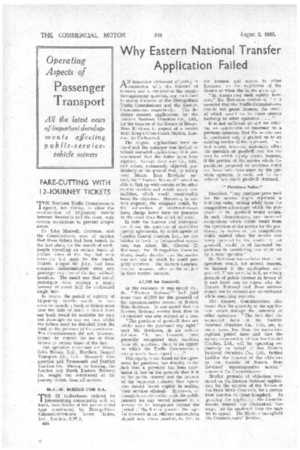Why Eastern National Transfer Application Failed
Page 32

If you've noticed an error in this article please click here to report it so we can fix it.
ANimportant statement of policy in connection with the transfer of licences, and a reference to the restrictive-agreement question, are contained in recent decisions of the Metropolitan Traffic Commissioner and the Eastern Commissioners respectively. The decisions concern applications by the Eastern National Omnibus Co., Ltd., for the transfer Of the licence of Messrs. Rose Brothers, in respect of a service from King's Cross Coach Station, London, to Chelmsford.
The original applications were refused and the company was invited to submit amended applications ; it is now announced that the latter have been rejected. George Ewer and Co., Ltd., and others, strenuously objected, particularly on the ground that, by taking over Messrs. Rose Brothers' service, the "Eastern National" would be able to link up with certain of its other express services and would secure new facilities, which would considerably harm the objectors. Moreover, in certain respects, the company could, by the summation of shorter-distance fares, charge lower fares for journeys to the coast than the scheduled rates.
In both the Eastern and Metropolitan Areas, the question. of restrictive agency agreements, by which agents of London Coastal Coaches, Ltd., arc forbidden to book for independent operators, was raised. MT. Gleeson 'E. Robinson, the Metropolitan Commissioner, finally decided that the matter was not one in which he could pro-. perly interfere. The Eastern Commissioners, however, refer to the subject in their written decision.
£3,500 for Goodwill.
In the evidence, it was stated that the Eastern National" had paid more than 0.500 for the goodwill of the unremunerative service of Messrs. Rose Brothers. It was stated that the Eastern National service from Bow to Chelmsford was also worked at a loss.
"The purchase of goodwill does not confer upon the purchaser any right," says Mr. Robinson, in his written decision. "it has, however, been generally recognized that, resulting from the purchase, there is an equity to which the Traffic Commissioners can properly have regard . . ."
This equity is not based on the agreement for purchase, nor directly in the fact that a payment has been made under it, hut on the grounds that it is in the public interest and the interest of the transport industry that opera' tors should invest capital in making
their services efficient. Moreover, although it would conflict with the public interest for any vested interest in a service to be recognized beyond the period of the licence granted, the .capitat invested in an efficient -undertaking should not, where possible, be lost to
the licensee and accrue to other licensees, on the expiration of the licence or when the holder gives up.
"In recognizing such equity, however," Mr. Robinson continues, "it is essential that the Traffic Commissioners should not grant licences, the result of which would be to cause serious hardship to other operators . . . ."
It is not sufficient ground for refusing an application as successor to a previous operator, that the service can be continued only if grafted on to an existing service of the applicant." That fact would, however, materially affect the question of goodwill and the extent to which equity exists, because, if the portion of the service which the purchaser proposed to continue could not have been maintained by the previous operator, it could not be considered that much goodwill obtained.
Fictitious Value."
Therefore, "any purchase price paid for the service might represent a fictitioue' value, arising solely. from the competitiere advantages which the purchaser of the goodwill would obtain. In such circumstances, any increased competition which would -result from the operation of the service by the purchaser, in excess of the competition which existed when the service was being operated by the vendor of the goodwill, would be of increased importance in considering any objection by a rival operator."
Mr. Robinson was satisfied that other operators would, for several reasons,he harmed if the application were . granted. There were, he said, no strong grounds of public interest in favour of it and there was no reason Why the Eastern National and Rose services should not be reduced and co-ordinated while remaining separate.
The Eastern Commissioners also found that the granting of the application svould damage the interests of other operators. "The fact that the summated fares of the Eastern National Omnibus Co., Ltd., are, in many cases, less than the authorized regional period faros and that the agency organization of London Coastal Coaches, Ltd., will be operating exclusively on. behalf of the Eastern National Omnibus Co., Ltd., further justifies the concern of the objectors to the transfer of Messrs. Rose Brothers' unremunerative service," comment the Commissioners.
Similar grounds of objection were raised on the Eastern National application for the transfer of the licence of the Horn Motor Coach Co. for a service from London to Great Sampford. In granting the application the Commissioners deleted the Chelmsford fare stage, but the applicant took the matter to appeal. The Minister has upheld the Commissioners' decision.












































































